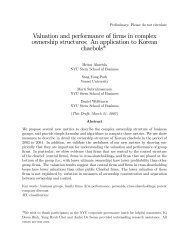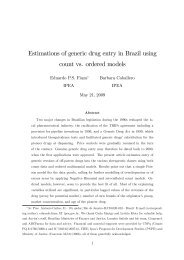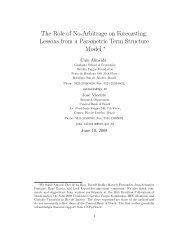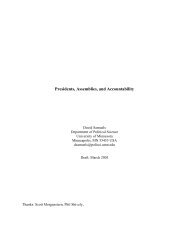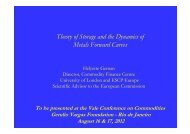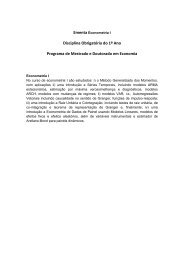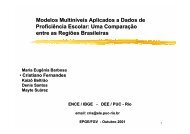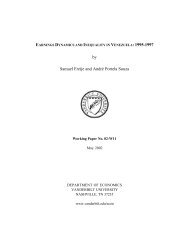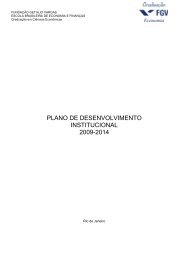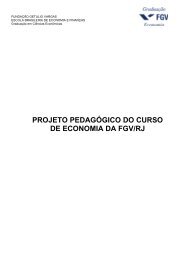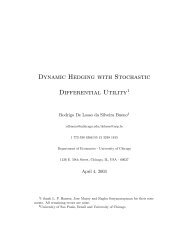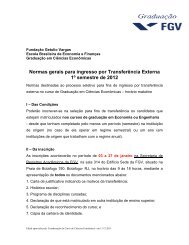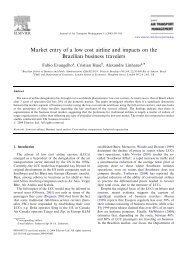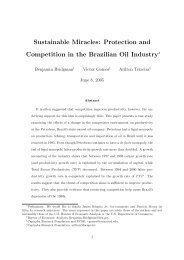Does Money in Schools Matter? Evaluating the Effects ... - EPGE/FGV
Does Money in Schools Matter? Evaluating the Effects ... - EPGE/FGV
Does Money in Schools Matter? Evaluating the Effects ... - EPGE/FGV
Create successful ePaper yourself
Turn your PDF publications into a flip-book with our unique Google optimized e-Paper software.
1) Introduction<br />
In terms of <strong>in</strong>come distribution, Brazil is one <strong>the</strong> most unequal countries <strong>in</strong> <strong>the</strong> world. 1<br />
Education plays an import role <strong>in</strong> expla<strong>in</strong><strong>in</strong>g this fact, as about 50% of <strong>the</strong> <strong>in</strong>come<br />
distribution <strong>in</strong> Brazil can be associated with education. This happens because returns to<br />
education are very high <strong>in</strong> Brazil and only a small proportion of <strong>the</strong> population has access<br />
to higher levels of education. 2 Despite <strong>the</strong> fact that access to <strong>the</strong> first school<strong>in</strong>g year is<br />
almost universal <strong>in</strong> Brazil, children from a poor background tend to drop out of <strong>the</strong> school<br />
system quite early on. 3<br />
One <strong>the</strong> reasons beh<strong>in</strong>d this high drop-out rate may be <strong>the</strong> quality<br />
of <strong>the</strong> education <strong>the</strong>y receive <strong>in</strong> <strong>the</strong> public system.<br />
In 1998, a reform <strong>in</strong> <strong>the</strong> fund<strong>in</strong>g of <strong>the</strong> public fundamental education system was<br />
<strong>in</strong>troduced <strong>in</strong> Brazil, with <strong>the</strong> creation of FUNDEF (Fundo para Manutenção e<br />
Desenvolvimento do Ens<strong>in</strong>o Fundamental e Valorização do Magistério – Fund for<br />
Ma<strong>in</strong>tenance and Development of <strong>the</strong> Fundamental Education and Valorization of<br />
Teach<strong>in</strong>g). FUNDEF ma<strong>in</strong> aim is redistribute resources from <strong>the</strong> richer to <strong>the</strong> poorer<br />
regions and to <strong>in</strong>crease public teachers´ wages. The aim of this paper is to exam<strong>in</strong>e whe<strong>the</strong>r<br />
<strong>the</strong> <strong>in</strong>troduction of FUNDEF has <strong>in</strong> fact <strong>in</strong>creased <strong>the</strong> earn<strong>in</strong>gs of <strong>the</strong> public school<br />
teachers, relative to <strong>the</strong>ir private schools counterparts, and <strong>the</strong> relative performance of<br />
public school pupils <strong>in</strong> test scores.<br />
The Brazilian education system is divided <strong>in</strong> cycles. The first cycle (primary<br />
education) consists of four years, <strong>the</strong> second (secondary) also has four years, <strong>the</strong> third (high<br />
1 The 10% <strong>in</strong> <strong>the</strong> top of <strong>the</strong> <strong>in</strong>come distribution appropriate 50% of all <strong>in</strong>come <strong>in</strong> Brazil.<br />
2 See Menezes-Filho et al (2002). A college graduate earns about three times more than a high school<br />
graduate and only about 10% of <strong>the</strong> population has a college degree.<br />
3 See Filmer, D and Prichett, L. (1998)



